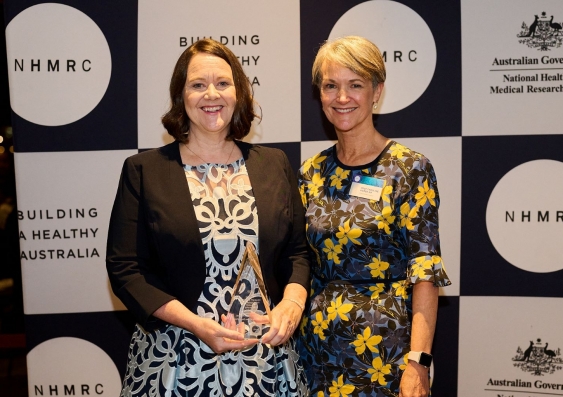UNSW researcher receives prestigious NHMRC award
A UNSW Sydney academic has been recognised at the 2021 NHMRC Research Excellence Awards for her research to improve the outcomes for women diagnosed with ovarian cancer.
A UNSW Sydney academic has been recognised at the 2021 NHMRC Research Excellence Awards for her research to improve the outcomes for women diagnosed with ovarian cancer.

Professor Susan Ramus, from UNSW Medicine & Health, was last night honoured at the National Health and Medical Research Council’s (NHMRC) annual Research Excellence Awards in Canberra.
Prof. Ramus received the ‘Elizabeth Blackburn Investigator Grants Award’ for the highest ranked NHMRC Investigator Grant in Basic Science research. Prof. Ramus was among 13 researchers whose grant applications were ranked the highest by their peers during NHMRC’s highly competitive peer review process.
“I am very honoured to receive this award. The research I lead is based on the analysis of thousands of samples and clinical data collected through large multi-institution international consortia. To me it is an acknowledgement of the value of a consortia approach to medical research,” Prof. Ramus said.
Prof. Ramus established, and is co-lead of, the Ovarian Tumour Tissue Analysis (OTTA) consortium. OTTA is a collaboration of more than 70 international groups with more than 15,000 tumours available for analysis. The aim of the consortium is to improve the prognosis for women diagnosed with ovarian cancer by identifying and validating prognostic markers.
“Through a series of grants, I have performed large scale genomic and transcriptomic analysis of thousands of tumours. Some of the key questions I hope to address are: should an individual woman have surgery or chemotherapy first; will they respond well to the current treatments or do they need an alternative, and can we predict the response to new drugs?” Prof. Ramus said.
“The majority of women with ovarian cancer receive the same treatment. My research aims to develop tumour tests that can be translated to the clinic, which determine the optimal treatment for each woman diagnosed with ovarian cancer.”
UNSW Dean of Medicine & Health, Scientia Professor Vlado Perkovic congratulated Prof. Ramus on receiving the award.
“This prestigious award acknowledges the outstanding contribution Susan is making in ovarian cancer research. Her recent research, which focuses on personalised treatments for ovarian cancer, is key to improving survival for this aggressive cancer,” Prof. Perkovic said.
“It is a testament to Susan that her peers have recognised her exceptional leadership in patient-centred research for ovarian cancer.”
The Elizabeth Blackburn Investigator Grants Awards promote and foster the career development of female researchers across a variety of fields. It is named after Australian-American Nobel Laureate Elizabeth Blackburn who received the 2009 Nobel Prize in Physiology/Medicine.
NHMRC CEO Professor Anne Kelso AO said the awards are an opportunity to celebrate Australian excellence in health and medical research at this time when community appreciation of the significance of research to our health and wellbeing is high.
“Today’s NHMRC Research Excellence Award recipients are our present and future research leaders. They follow in the footsteps of earlier giants of Australian research as they seek to understand and solve the health challenges that face our community today.”